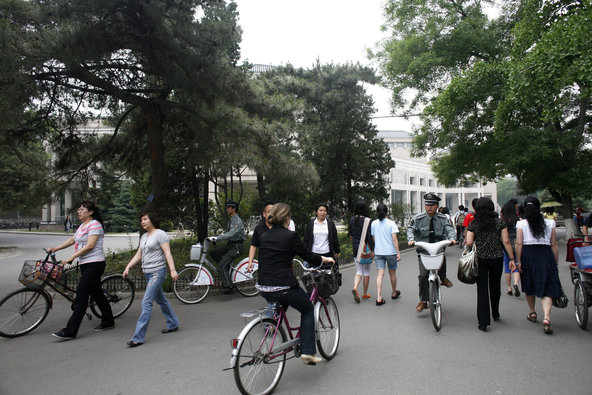Amid the Xi administration’s continuing efforts to promote ideological orthodoxy, the New York Times reports that three of China’s leading universities have pledged to aid in the campaign with statements published in the Party political theory journal Qiushi:
The party committee of Fudan University focused on fostering identification with socialism among faculty members under 45 years old, while Sun Yat-sen University envisioned a “healthy and positive online environment” and more online Marxist education. The Peking University committee vowed to improve its online opinion-monitoring system and urged its students and staff to wage a “resolute struggle” against speech challenging the party’s core values.
[…] According to a recent Peking University graduate who would give only her surname, Yang, the system is run from the Youth Research Center under the Department of Student Affairs. A job posting on the university’s website shows the center is recruiting people from outside and inside the university who can assist in its “online ideological and political education.” Applicants must be party members, it says.
A Peking University graduate student, who asked not to be named, said that in addition to the center’s monitoring work, professors designate “student cadres” to pay attention to their fellow students’ speech and actions both on and offline and to report back to the professors anything suspect or unusual. He said he had done this himself for two years as an undergraduate.
“We weren’t offered any guidelines in terms of what we should report. It’s more common sense,” the student said, adding that students are aware that there are monitors like himself in their midst. [Source]
More from Reuters on how Peking University’s “resolute struggle” against speech critical of the Party indicates anxiety among leaders, and on the prestigious school’s history as a “bastion of free speech”:
One of China’s top universities has urged students and teachers to “fight against” criticism of the ruling Communist Party, an influential party journal said, in the latest curbs on free expression.
The move by Peking University, which at one time was a bastion of free speech in China, underscores increasing anxiety of criticism among party leaders and is a sign of Chinese President Xi Jinping’s politically conservative agenda.
Curricula and speech at Chinese universities are tightly controlled by the government, though students at Peking University have at times pushed the limits, including during the 1989 Tiananmen Square pro-democracy protests that were brutally suppressed by the army. [Source]
Last October, outspoken (and controversial) professor Xia Yeliang was “expelled” from his post at Peking University, and in December East China University of Law professor Zhang Xuezhong was fired, allegedly over writings criticizing the Party. In June of this year, a Party disciplinary official warned that government think tank the Chinese Academy of Social Sciences had fallen under the influence of “foreign forces.” The Xi administration’s ideological work has also been targeting the media, and last weekend the All-China Journalists’ Association ordered the nation’s reporters to learn “Marxist news values.”








